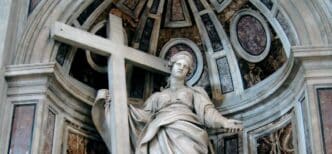“Back in my internet apologetics days,” my young friend Tim told me, “I mostly used converts as weapons against various strains of Protestantism.” He’d grown up Catholic and had read lots of conversion stories, and he found those converts’ testimonies about their former religions’ problems and failures useful.
He learned something else. He found the converts he liked the most “were not those who had the most devastating arguments against their former sect, but the ones who looked back on their previous experiences with sincere appreciation and affection. Ex-Catholic evangelicals often seemed to look back on Catholicism with bitterness or disdain, but Catholic converts saw God working in their lives before they crossed the Tiber.”
Three qualifications
Tim’s observations generally fit my own as a convert, with three qualifications. First, I’ve known some Catholic converts who feel very bitter about the religious bodies they grew up in, especially if they grew up fundamentalist.
Second, grateful converts often remember with gratitude the good people they knew, but not so much the religion itself. They see goodness and holiness in people whose religion they came to believe is defective.
I credit my own conversion to serious Christianity in part to a saintly Baptist deacon and his son. They were wonderful people whose lives made the Gospel story credible, but they believed things I knew even then were wrong. Some of those things were destructively wrong, like their bigoted view of the Catholic Church, which they tried to impart to me.
Third, some people who talk publicly the way Tim describes are much more bitter and critical in private. A former Episcopalian I knew many years ago, and quite admired, who eventually became a friend, would talk about the wonders of the evangelicalism of his youth and the beauties of the Anglicanism to which he’d moved as an adult.
He praised them lavishly. The audiences would coo. They would say about him what Tim said about the converts he most liked.
Not what he thought
However, that was not exactly what he really thought. He told me once, when we were both speaking at a conference held at an evangelical institution, that he could not go into an Episcopal church without a panic attack.
He saw it as a fraud and an imitation — especially if it had a tabernacle with bread in it — and felt that its pretense to be Catholic had kept him out of the Catholic Church for years, which he bitterly regretted. (St. John Henry Newman said something like this a couple decades into his Catholic life.)
Someone once attacked me for a mild apologetic argument I made for the Church by contrasting me with this man. I could only smile, thinking, “If only you knew.” He really did create a great deal of confusion.
Over the years I have known several Episcopalians who felt drawn to the Catholic Church but looked for a good excuse not to move — a feeling I fully understood, having succumbed to it for years.
When we talked, they invoked my friend’s praise of his former home as a reason to scurry back to safety. They said that if my friend were right, 1) Episcopalianism was obviously good enough, and they thought it had other advantages over Catholicism, or 2) Catholicism might be better, but it wasn’t different enough to justify such a break. They believed they had his approval in saying this.
They weren’t wrong to think that way. He never drew the line between the Church and their religious bodies very clearly and certainly not starkly. He presented it as a better version of something they already had in great part, like recommending to someone who liked a cheaper wine a somewhat better vintage. He forgot that they may have very good reason to prefer the cheaper wine, not least the cost.
What he could have told them
I couldn’t, without breaking a confidence, tell these people that if my friend had spoken more honestly, he wouldn’t be telling them — as in effect he did — to move from their very nice neighborhood to the nicest neighborhood in town. He’d be pleading with them to leave a burning house.
In these conversations, we Catholics want to be generous, but we also need to tell our Protestant friends that here is the Church God gave us, not there. Whatever value theirs has, it’s not the Church in her fullness. They may be holier than many Catholics, but they’re still in the wrong place.
How to say that well is a question. We want people to enter the Church because they want to get inside, not because they’re fleeing their churches. We want to be fair to their churches and acknowledge the godliness we see there. But we must remember that telling them what the Church says about herself is part of being generous.








